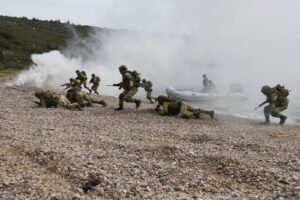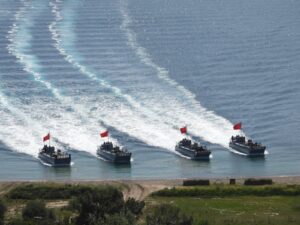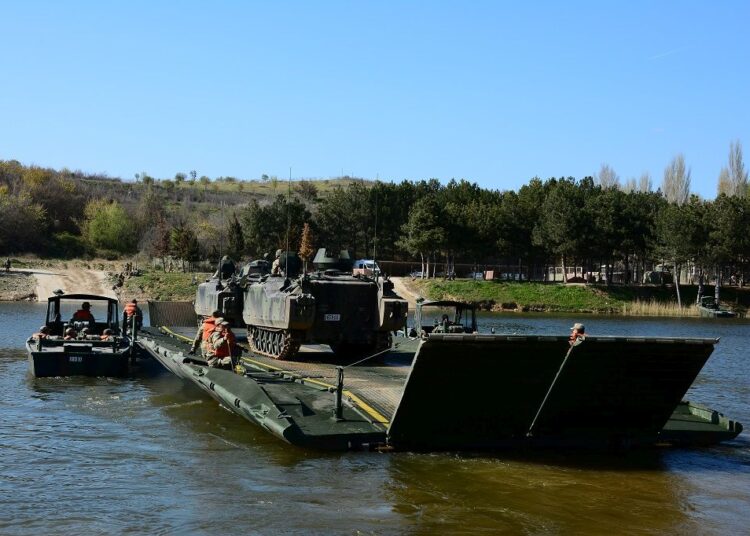Abdullah Bozkurt/Stockholm
Turkey’s contingency war plans against Greece — particularly targeting Western Thrace and the Aegean islands — have suffered a serious setback due to the expanded military presence of the United States and France in support of Greek defense, prompting a wave of sharp criticism from Turkey’s increasingly frustrated leadership, including President Recep Tayyip Erdogan, in recent years.
Turkey’s military strategy for a potential incursion into Greek territory, particularly Western Thrace, was designed to exploit a narrow window of opportunity, which Turkish generals anticipated would close quickly with swift intervention from the US and Europe following any Turkish offensive.
These secret plans were first revealed during the 2010 “Sledgehammer” (Balyoz) trial in Istanbul, which exposed the mindset of hardline Turkish generals considering such contingencies. At the time the revelations drew little attention, likely because they were buried in the annexes of an extensive case file, whose primary focus was a domestic power struggle between influential military leaders and the civilian government.
However, the overwhelming evidence in the case file — including authenticated documents, voice recordings and General Staff reports — confirmed that detailed war plans were indeed discussed during a military seminar held March 5–7, 2003, under the leadership of then-commander of the 1st Army Corps, General Çetin Doğan. Approximately 30 senior officers took part in the seminar.
Excerpt from a PowerPoint presentation on Turkish military contingency planning regarding a potential military offensive against Greece:
Headquartered in Istanbul, the 1st Army Corps is tasked with defending Turkey’s Thrace region, which borders Greece, as well as securing the Bosporus Straits, Istanbul and the broader Marmara region. The seminar was also attended by representatives from the Turkish General Staff and other military units.
The central focus of the war plan was a military operation in the Aegean, with supplementary actions in the Thrace region of Greece to support the primary theatre. The planners emphasized that any military action in Thrace should focus not on territorial conquest, but on inflicting maximum damage to enemy forces. The objective was to punish rather than occupy.
“The measures to be taken in Thrace must support the operation in the Aegean,” stated the seminar’s final report. “The objective in this region should be less about territorial gains and more focused on destroying as many enemy forces as possible.”
A summary of the seminar’s classified report was presented to participants in a PowerPoint presentation, a copy of which was later obtained by Nordic Monitor.
The seminar also revealed the prevailing mindset among Turkish military planners at the time, particularly those with anti-American and anti-NATO views. While Erdogan initially clashed with these officers, he eventually formed a decade-long political alliance with them and their civilian supporters, collectively known as Ulusalcılar (neo-nationalists), in 2014.
According to the seminar report, Turkish strategists anticipated that NATO and the EU would quickly intervene if Turkey launched a military offensive in Greece’s Thrace region. Consequently, they concluded that Turkey would have only three to four days to achieve its objectives — enough to inflict significant damage on Greek forces, but not enough for long-term occupation. The ultimate goal, they argued, was to seize control of the Aegean islands.

While these plans may have evolved, been revised and updated over time, their fundamental structure and overall objective are believed to have remained intact. However, the strategic landscape has changed dramatically, much to the dismay of Turkey’s war planners, making a military offensive against Greece more challenging than before.
Greece’s recent military cooperation agreements with the US and France — particularly those granting the US expanded access to Greek military and naval bases — have severely undermined Turkey’s invasion plans. The presence of US troops at these facilities makes it considerably riskier for Turkey to target Greek military assets since doing so could provoke a direct confrontation with the United States, something Ankara is eager to avoid.
This is undoubtedly a key factor behind Ankara’s increasingly hostile rhetoric toward Washington’s defense engagement in Greece and its vocal opposition to Greece’s strengthened defense ties with both the US and France.
During a joint press conference with Hungarian Prime Minister Viktor Orbán in Ankara on November 11, 2021, President Erdogan expressed his frustration publicly, stating, “Greece itself has now become a base for the United States. I couldn’t even count the number of US bases inside Greece, there are just that many. When you look at the map, Greece itself resembles an American military base. That’s the reality.
“Why are all these bases being established, and for what purpose? We’ve asked — my defense minister, my foreign minister, and I have asked President Biden and others — and we keep getting evasive answers. They’re not being honest. The neighbor they’ve chosen is the wrong one, and using Greece as a base in the Aegean is the wrong approach.”

Erdogan echoed similar criticism of the US, Greece and France at public rallies, while senior government and military leaders also reiterated the same talking points.
US officials have denied Turkey’s accusations, claiming that American engagement with Greece is not intended as a threat to Turkey, which remains a fellow NATO ally. On October 18, 2022, US Ambassador to Turkey Jeff Flake tweeted: “Our defense cooperation with Greece strengthens NATO’s eastern flank in support of Ukraine and our NATO allies in Central and Eastern Europe. Our shared objective with Türkiye and Greece is peace, security, and stability throughout the region.”
In recent years US-Greece defense collaboration has intensified, marked by expanded joint military exercises, updated agreements and increased military assistance, which helped elevate Greece’s role in regional and transatlantic security.
In 2019 and 2021 Greece and the US updated the 1990 Mutual Defense Cooperation Agreement (MDCA), granting American forces greater access to Greek bases, including Alexandroupolis, which is located near the Turkish border, and the crucial Souda Bay base on Crete.
The US has also sold billions of dollars in defense systems to Greece, helped modernize its F-16 fighter jets and is considering selling fifth-generation fighters to the Greek Air Force. US and Greek armed forces participate in more than 15 major joint military exercises annually.

The US presence at Alexandroupolis, a port just 40 kilometers from the Turkish border, has particularly alarmed Ankara. The base serves as a vital transit hub for US and NATO forces moving equipment to Eastern Europe, effectively bypassing the Turkish-controlled Bosporus Strait. Likewise, the potential stationing of US troops on Aegean islands has emerged as another significant irritant for Turkish leaders.
France, too, has bolstered Greece’s defense posture. In September 2021 Athens and Paris signed a landmark defense agreement committing mutual military support in the event of an armed attack on either nation. The agreement facilitated Greece’s procurement of advanced French weaponry, including Rafale fighter jets, missiles, frigates and helicopters.
These developments have severely limited Turkey’s military flexibility and undermined its contingency invasion plans for Greece. As a result, both Turkish civilian and military leaders have ramped up their criticism of the trilateral defense cooperation between Greece, the US and France, viewing it as a direct obstacle to Turkey’s strategic ambitions in the region.
The secret seminar report suggests that the hawkish rhetoric displayed by Turkish leadership is not merely intended for domestic consumption, such as distracting the public from internal issues like financial hardship, unemployment and rising consumer prices, or to garner votes during election campaigns, as some pundits suggest.
There is, in fact, real strategic thinking behind Turkey’s warmongering stance toward Greece, one that cannot be dismissed or brushed aside by Turkish diplomats and pro-Turkey pundits’ apologetic justifications, which aim to obscure the optics by claiming they were intended solely for domestic consumption.












